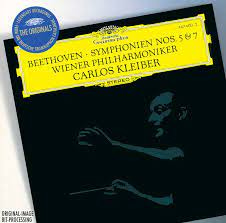The #1 on my list of the top 50 classical recordings of all time is an easy choice. If you research any list of the greatest classical recordings ever, this recording of Beethoven’s Fifth and Seventh Symphonies by Carlos Kleiber and the world-class Vienna Philharmonic almost always appears. In addition to bringing together two of Beethoven’s most enduringly popular symphonies, the performance and recording are probably as close to perfection as anyone can expect from a musical recording.
Recordings of the Beethoven symphonies are legion, owing to their variety and timeless quality. There are also too many wonderful accounts of these two warhorse symphonies to count, and not enough space to review them. But this recording by the Vienna Philharmonic conducted by Carlos Kleiber is simply at a higher level. The Vienna Philharmonic of course could play these pieces in their sleep, but far from sleepy these are driven, passionate, powerful, and captivating performances.
The Fifth is especially memorable. There is precision execution, drama, and very good sound for the time it was made in 1974. The Allegro con brio first movement opens with the most famous four-note motif in Western music. It is one of the most instantly recognizable set of notes in the world. Much has been said and written about the possible meaning of these first ominous notes, but one cannot deny the power and feeling they represent. In this recording, Kleiber and the VPO play the two opening four-note sets relatively quickly with little break between the two sets of notes. This sort of dynamic forward momentum continues throughout the recording of the Fifth, accompanied by steely strings, braying brass, precise climaxes and percussion, and just the right amounts of both solemnity and exuberance where needed. The “air” or very slight analog hiss around the orchestra in the recorded sound lends an feeling of importance to the entire recording. This is music that moves you. It is elemental in its direct impact. It just feels right. Beethoven is hardly ever portrayed as smiling in portraits, and yet this performance must make him smile.
The performance of the Seventh here, while not quite as distinguished as the Fifth, is also among the best of all available recordings of this wonderful symphony. Many of the same qualities present in the Fifth are here as well. The forward movement, crisp articulation, and ferocity of attack an be heard. The rhythmic contrasts and passages introduced throughout the symphony are brought out very well here, and in the unison “tutti” passages come across with power. Wagner described Beethoven’s Seventh as the “apotheosis of dance” and the dance-like episodes feel very much like dances in this version. The screaming horns at the end of the first movement are done to perfection. The second movement, which feels almost like a funeral march at times, is not over-sentimentalized but moves along with a purpose. The third movement Presto-Assai bounces right along, and the Allegro con brio finale bursts with energy and momentum. It is a joyful symphony, and one that practically sweeps us off our feet. It is easy to understand why this was one of Beethoven’s own favorite compositions.
Austrian conductor Carlos Kleiber (son of eminent Austrian conductor Erich Kleiber and American Ruth Goodrich), died in 2004 at the age of 74, is regarded as the one of the greatest conductors of all time, and yet at the same time he was one of the most reclusive and recording aversive conductors of his generation. He made a small number of recordings in addition to this one, only releasing nine studio albums. While the quantity was small, the quality of his recordings was impressive. His other legendary recordings include readings of Die Fledermaus, La Traviata, Schubert’s Unfinished, and Brahms 4th. His Vienna New Year’s concerts are considered one of the finest collection of Strauss waltzes available. When Herbert von Karajan resigned from the Berlin Philharmonic Orchestra in 1989, Kleiber was offered the post but declined it. He only gave one media interview during his professional career. He would rehearse orchestras in painstaking detail, but performances often gave the impression of spontaneity and inspiration. This recording sits at the top of the pile. An essential recording.
—
Notes:
https://en.wikipedia.org/wiki/Carlos_Kleiber_discography
https://en.wikipedia.org/wiki/Carlos_Kleiber
https://en.wikipedia.org/wiki/Symphony_No._5_(Beethoven)
https://en.wikipedia.org/wiki/Symphony_No._7_(Beethoven)


